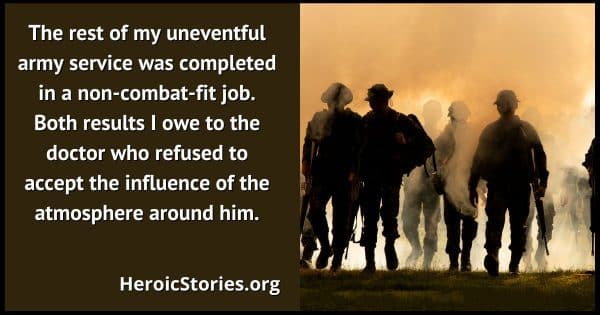by Aryeh Abramovitz
Israel

“Are you refusing my order?” half-shouted the sergeant.
“No sir,” I said quietly, “I just can’t do it.”
Before our confrontation generated court-martial threats, the squad commander called the sergeant aside. Returning, he read off, “Abramovitz, Guri… get on the truck to main camp.” “Consider yourself lucky,” he said as I passed.
Sitting on the hard truck bench, I pondered my predicament. I had looked forward to fulfilling my patriotic duty, even daydreaming of glory and machismo. Then a freak accident broke both my wrists and injured my back.
At preliminary induction two months before boot camp, both my hands were in casts. “Don’t worry,” they said, “first week of boot camp everyone’s re-evaluated.” Filled with motivation to serve my country as a combat soldier, I hoped to heal completely before final induction.
At re-evaluation, my profile adjusted downwards only slightly; I was still labeled combat-fit. For days, I ran around with the other fresh-faced inductees, determined to make it. When I put on my fully loaded battledress, a deep pain immediately seared my back. The medic temporarily excused me from wearing loads — and thus began the humiliating process of medical appeals.
Seventy-five days and several medical committees later, I was still in the combat-fit platoon, doing kitchen patrol, guarding tents, and being called a shirker. Then I had gone to sleep without my gun strapped to me, and an officer had “stolen” it, an offense for which I knew a court-martial was probably waiting.
That week, the sergeant told me to report to the clinic doctor and then to the camp commandant’s office, no doubt for the court-martial. Sitting at the clinic, I steeled myself for a stint in the brig.
“Abramovitz?” I heard from the doctor’s office. “So, you’re the famous Abramovitz. Have a seat,” he said. “Your case was reviewed by the public ombudsman from your mother’s appeal, but I can’t understand the medical committees’ decisions. Back injuries are automatically non-combat-fit for a year from the date of injury. I’ll write my diagnosis and recommendation. You’ll report to the medical committee at Haifa.”
I told the doctor about my orders to the commandant’s office — likely for a court-martial — and added, “Besides, I can’t travel in a work uniform.”
“I will order you hospitalized in my clinic tonight. Tomorrow I’ll send you out of camp on a special pass, including a permit to travel in your work uniform.”
Most army authorities I encountered represented the “rules and regulations army.” Even if they understood my injuries, they wouldn’t stick their necks out on my behalf. The doctor acted independently — a human in a dehumanizing system.
He could have written his diagnosis and recommendation and sent me along, leaving me to deal with the system by myself. Instead, he circumvented my court-martial. The rest of my uneventful army service was completed in a non-combat-fit job. Both results I owe to the doctor who refused to accept the influence of the atmosphere around him… and instead acted according to what he believed to be right.
Podcast: Play in new window | Download (Duration: 4:38 — 3.7MB)


How humiliating! Discipline is one thing in the army. Cruelty and abuse is another. I’m glad the author found a human being who could plead his case and treat him as an injured soldier in training should be treated.